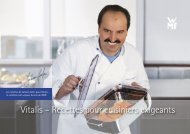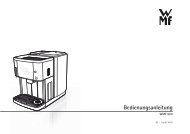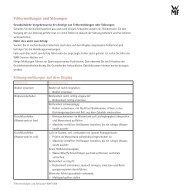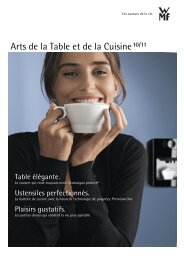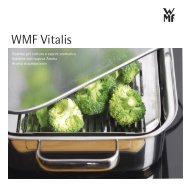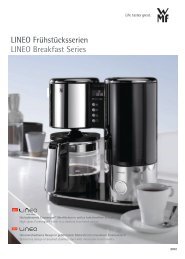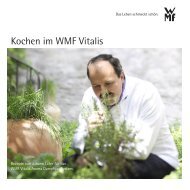jette joop - Wmf
jette joop - Wmf
jette joop - Wmf
Sie wollen auch ein ePaper? Erhöhen Sie die Reichweite Ihrer Titel.
YUMPU macht aus Druck-PDFs automatisch weboptimierte ePaper, die Google liebt.
JOHANN<br />
LAFER<br />
Schon als Kind träumte Johann Lafer davon,<br />
kochen zu lernen. Heute gehört der Sterne-<br />
Koch zu den profiliertesten auf seinem<br />
Gebiet. Mit seinen Büchern und Fernseh-<br />
Auftritten schult er auf charmant-österreichische<br />
Art den deutschen Geschmack.<br />
Für WMF hat Johann Lafer eine ganze Reihe<br />
von Produkten entwickelt wie zum Beispiel<br />
den Dampfgarer WMF Vitalis.<br />
Herr Lafer, hatten Sie als Kind ein Lieblingsgericht?<br />
Johann Lafer: Ja, es war das echte Wiener<br />
Schnitzel und das ist es auch noch heute!<br />
Sie sind auf dem Bauernhof groß geworden.<br />
Was bedeutet das für Ihren Umgang mit Essen?<br />
Johann Lafer: Meine Kindheit auf dem Bauernhof<br />
hat mein Verhältnis zu Lebensmitteln grundsätzlich<br />
geprägt. Wer weiß, wie viel Arbeit und<br />
Aufwand dahinter stecken um gute Produkte zu<br />
erzeugen, zollt denselben den größten Respekt.<br />
Kann man genießen lernen?<br />
Johann Lafer: Ja, das kann man! Am besten<br />
man fängt als Kind schon damit an. Ich halte es<br />
für äußerst wichtig, dass Eltern ihre Kinder lehren,<br />
welchen Wert gute Lebensmittel haben und wie<br />
sie echten Geschmack kennenlernen. Im besten<br />
Fall lassen Eltern die Kids mitkochen. Sehr wichtig<br />
ist auch das gemeinsame Genießen am schön<br />
gedeckten Tisch. Das fördert die Kommunikation<br />
und die Gemeinschaft.<br />
Die italienische Küche gehört zu den beliebtesten<br />
weltweit. Zu Recht?<br />
Johann Lafer: Der Ursprung der europäischen<br />
Küche kam über Kleinasien nach Italien, von<br />
dort brachte Katharina de Medici, die Freude<br />
am gemeinsamen Tafeln und die Beachtung der<br />
Zubereitung nach Frankreich. Ich denke, dass<br />
die Südeuropäer die größeren Genießer sind.<br />
Sie achten mehr auf ihre Küche als aufs Auto.<br />
Zudem ist die italienische Küche eine relativ<br />
einfache Küche, die mit wenig Aufwand gute<br />
Ergebnisse erzielt.<br />
Sie haben für WMF eine ganze Reihe von<br />
Produkten entwickelt. Was ist Ihr Anteil und<br />
Ihre Intention hinter diesen Produkten?<br />
Johann Lafer: Mein Grundsatz lautet: Nur das,<br />
was ich mit Freude selbst verwende, empfehle<br />
ich auch gerne weiter. Das heißt, wenn man gut<br />
kochen will, muss auch das Handwerkzeug<br />
stimmen. Vieles, was auch der Hausfrau oder<br />
dem Hobbykoch die Arbeit erleichtern könnte,<br />
fällt mir beim Kochen ein. Dann spreche ich mit<br />
den WMF-Produktentwicklern und wir testen<br />
es aus. Bei allen Produkten wird die Alltagstauglichkeit<br />
von mir und meinem Team getestet.<br />
Wenn jemand nicht wirklich erfahren ist im<br />
Kochen, sich aber gut ernähren möchte, was<br />
empfehlen Sie dieser Person zu kochen und<br />
welches Produkt von WMF macht es leicht?<br />
Johann Lafer: Alles fängt mit einfachen, aber<br />
frisch gekochten Speisen an. Man sollte sich<br />
nicht zu viel zumuten und gleich „Gourmetküche“<br />
kochen wollen. Zum Beispiel kann man im WMF<br />
Vitalis ganz viele Gerichte ohne große Vorkenntnisse<br />
perfekt zubereiten.<br />
Sie haben darüber hinaus einen Lehrauftrag<br />
für Kulinaristik, Esskultur und Kochkunst.<br />
Warum reicht es für einen Koch nicht mehr<br />
aus, einfach nur gut kochen zu lernen?<br />
Johann Lafer: Es geht bei dem Lehrauftrag<br />
nicht darum Köchen das Kochen beizubringen,<br />
sondern angehenden Oecotropholgen zu zeigen,<br />
wie sie die gesunden Lebensmittel, deren<br />
Nährwerte und Aufgaben sie bestens kennen,<br />
schonend und schmackhaft zubereiten können.<br />
Wie interpretieren Sie den WMF-Satz<br />
„Das Leben schmeckt schön“?<br />
Johann Lafer: Im Leben hat das meiste mit<br />
Geschmack zu tun. Wenn wir uns bewusst ernähren,<br />
Respekt vor Lebensmitteln haben und mit<br />
Liebe kochen, dann schmeckt das Leben schön!<br />
Even as a child, Johann Lafer dreamt of<br />
learning to cook. Today, this award-winning<br />
chef is one of the most distinguished in<br />
his field. In his books and television<br />
appearances he teaches about German<br />
flavours in his charming, Austrian way.<br />
Johann Lafer has developed a whole range<br />
of products for WMF, including the WMF<br />
Vitalis steaming system.<br />
Mr Lafer, did you have a favourite meal<br />
as a child?<br />
Johann Lafer: Yes, it was real Wiener schnitzel<br />
and it still is today!<br />
You grew up on a farm. How has that affected<br />
your approach to food?<br />
Johann Lafer: My childhood on the farm had<br />
a great impact on my relationship with food.<br />
Anyone who knows how much work and effort<br />
goes in to creating good produce will treat it with<br />
the greatest respect.<br />
Can you learn to enjoy food?<br />
Johann Lafer: Yes, you can! Ideally this begins<br />
in childhood. I believe it is extremely important<br />
that parents teach their children the value of good<br />
food and how to recognise real flavours from a<br />
very young age. The best case scenario would be<br />
parents letting their kids cook with them. Another<br />
important element is enjoying food together at a<br />
beautifully laid table. This promotes communication<br />
and companionship.<br />
Italian cuisine is one of the most popular<br />
styles worldwide. Is this rightly so?<br />
Johann Lafer: The beginnings of European cuisine<br />
came through Asia Minor to Italy, from where<br />
Catherine de Medici brought the concepts of<br />
enjoying dining together and paying attention<br />
to preparation to France. I would say that<br />
southern Europeans are the greatest epicures.<br />
They are more interested in cooking than cars.<br />
In addition, Italian cuisine is relatively simple<br />
and offers good results with little effort.<br />
You have developed a whole range of products<br />
for WMF. What input and intentions did you<br />
have for these products?<br />
Johann Lafer: My basic principle is that I will only<br />
happily recommend things which I enjoy using<br />
myself. In other words, if you want to cook well<br />
you need the right tools. Many items which make<br />
work easier for housewives or amateur cooks also<br />
appear in my own cooking. I then speak to the<br />
WMF product developers and we test it out.<br />
Each product’s suitability for daily use has been<br />
tested by me and my team.<br />
If someone has no real cookery experience but<br />
wants to eat well, what would you recommend<br />
that they cook and which WMF product would<br />
make it easy?<br />
Johann Lafer: Everything begins with simple<br />
but freshly cooked dishes. You shouldn’t expect<br />
too much of yourself and try to cook “gourmet<br />
dishes” right from the outset. For example, you<br />
can prepare a wide range of dishes perfectly in<br />
the WMF Vitalis without a great deal of prior<br />
knowledge.<br />
You are also a lecturer in culinary studies,<br />
food culture and the art of cooking.<br />
Why is it no longer enough for a chef to<br />
simply learn to cook well?<br />
Johann Lafer: The lectureship is not about<br />
teaching chefs to cook, but instead about<br />
showing prospective nutritionists how to prepare<br />
foods, of whose nutritional values and roles they<br />
are already well aware, in a tasty way.<br />
How do you interpret the WMF slogan<br />
“life tastes great”?<br />
Johann Lafer: In life, most things come back<br />
to taste. If we are conscious of our diet, show<br />
respect for our food and cook with love, then<br />
life tastes great!<br />
WMFMAGAZINE2012 | 11



